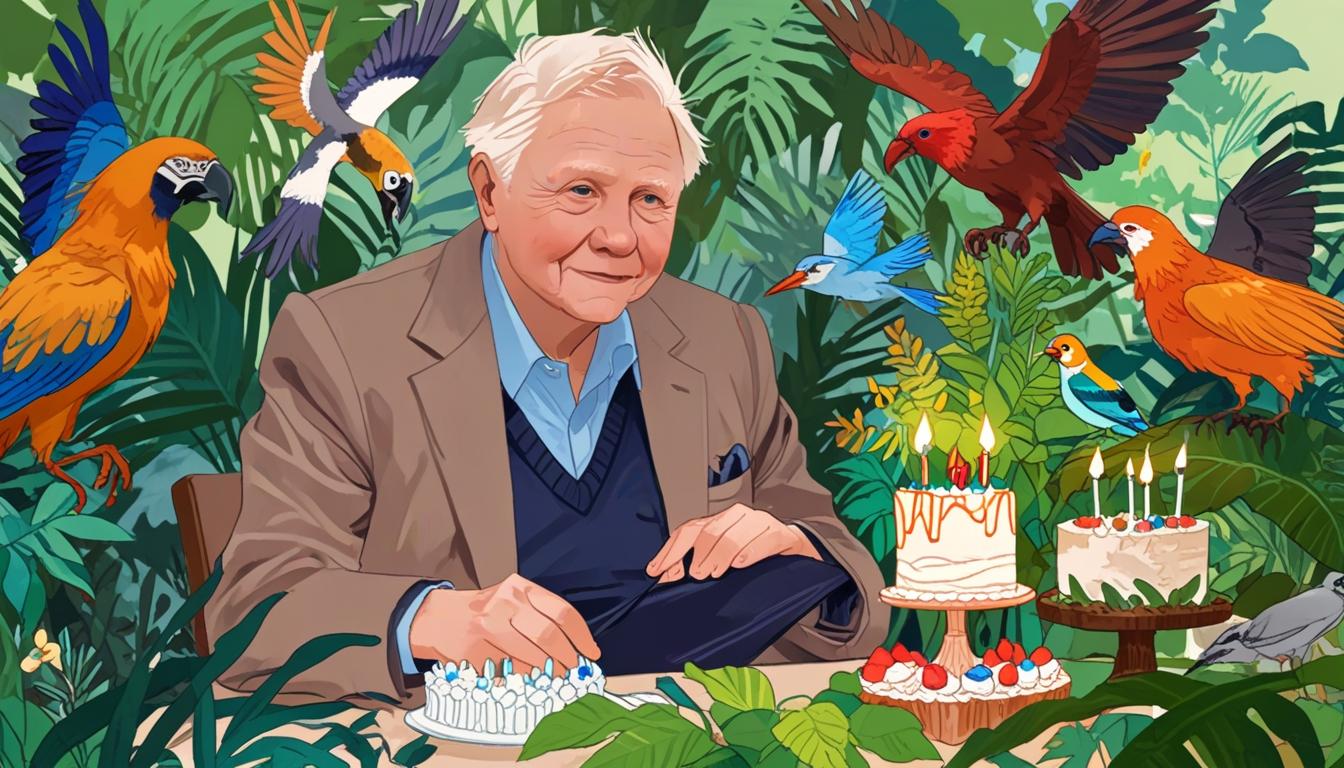As David Attenborough marks his 99th birthday with widespread tributes, a growing number of parents in St Albans campaign for a ban on smartphones for under-14s amid concerns over mental health and education. Meanwhile, celebrity disputes and ticketing struggles underscore the modern challenges that contrast with Attenborough’s legacy of environmental stewardship.
David Attenborough, a name synonymous with nature documentary filmmaking and environmental advocacy, recently celebrated his 99th birthday—a milestone that prompted tributes from an impressive roster of admirers, including Barack Obama, Billie Eilish, and Morgan Freeman. This star-studded homage, detailing the profound impact Attenborough has had on millions worldwide, highlights not only his commitment to educating people about the natural world but also serves as a reminder of the urgency of environmental issues. As Attenborough’s body of work continues to inspire a deep appreciation for nature, his influence reaches far beyond traditional nature programming; he embodies a generation’s hope for environmental stewardship.
However, the landscape of contemporary distractions—from smartphones to social media—stands in stark contrast to the ideals championed by Attenborough. In St Albans, UK, since last year, local educators have voiced growing concerns regarding the increasing prevalence of smartphones among children under 14. Following a public outcry, over 100,000 parents signed a petition advocating for a ban on smartphones for that age group, underscoring worries about the negative effects on mental health and academic performance. As Amelia Gentleman reported, while St Albans is yet to become a smartphone-free haven for children, there are signs of progress. The community’s attempts to limit smartphone access reflect a broader societal struggle for balance in a technology-driven world that often overshadows the natural one.
Inescapably, this tension between technology and nature also filters into celebrity culture. The recent public discourse surrounding Blake Lively and Justin Baldoni, as explored by Steve Rose, exemplifies an alarming trend within American pop culture. The dispute escalated beyond mere celebrity squabbles to warrant the involvement of political figures. This “misogyny slop ecosystem,” as characterised by certain commentators, illustrates how celebrity narratives can transcend entertainment, creating a fractious atmosphere where personal conflicts are weaponised for larger political agendas. Here, celebrity and politics entwine disturbingly, challenging our understanding of genuine public opinion versus manufactured outrage.
As the live entertainment industry grapples with its own headaches, particularly relating to ticketing, the influence of one company—Ticketmaster—has come under scrutiny. Dorian Lynskey’s in-depth investigation reveals a pattern where fans often encounter overwhelming hurdles just to secure tickets to their favourite artists, exemplified during last summer’s chaotic Oasis ticket sales. With its vast control over the ticketing landscape, Ticketmaster has seemingly become the figurehead of frustration among music lovers, offering a cautionary perspective on consumer rights in a monopolistic marketplace that often leaves fans feeling disempowered.
While the tributes to Attenborough resonate with a vision of conservation and respect for nature, other narratives—such as the struggles of children against an omnipresent digital culture or the hiccups faced by ticket-buyers—paint a more complex picture of contemporary life. These stories remind us that while we celebrate figures like Attenborough, the fight for a balanced future—one that honours both our natural environment and the wellbeing of younger generations—remains an ongoing challenge. As society navigates these multifaceted dilemmas, perhaps the wisest course lies in striking a delicate balance, allowing space for both nature and technological advancement within our daily lives.
Reference Map
- Paragraphs 1, 2
- Paragraphs 2, 3
- Paragraphs 2, 3
- Paragraphs 3
- Paragraphs 4
- Paragraphs 5
- Paragraphs 6
Source: Noah Wire Services
- https://www.theguardian.com/news/2025/may/10/six-great-reads-misogyny-slop-ecosystem-attenborough-99-ticketmaster – Please view link – unable to able to access data
- https://www.theguardian.com/news/2025/may/10/six-great-reads-misogyny-slop-ecosystem-attenborough-99-ticketmaster – An article from The Guardian’s ‘Six great reads’ series, featuring six notable pieces, including a tribute to David Attenborough’s 99th birthday, an exploration of the smartphone ban in St Albans, and an examination of the Guardian’s reporting during the former Yugoslavia conflict.
- https://www.theguardian.com/technology/article/2024/may/22/st-albans-headteachers-call-for-under-14s-smartphone-ban – An article from The Guardian discussing how headteachers in St Albans, UK, called for a ban on smartphones for children under 14, urging parents to delay giving their children smartphones until they reach the age of 14.
- https://www.theguardian.com/society/2025/mar/13/campaign-to-bar-under-14s-from-having-smartphones-signed-by-100000-parents – An article from The Guardian reporting on a campaign that garnered 100,000 signatures from parents committing to bar their children from owning smartphones until they are at least 14, highlighting concerns over children’s mental health and academic success.
- https://www.theguardian.com/lifeandstyle/article/2024/jun/30/we-wanted-to-change-the-norm-on-smartphone-use-grassroots-campaigners-on-a-phone-free-childhood – An article from The Guardian featuring grassroots campaigners advocating for a phone-free childhood, discussing their efforts to change the norm on smartphone use among children and the impact of technology on children’s development.
- https://www.theguardian.com/news/2025/may/10/six-great-reads-misogyny-slop-ecosystem-attenborough-99-ticketmaster – An article from The Guardian’s ‘Six great reads’ series, featuring six notable pieces, including a tribute to David Attenborough’s 99th birthday, an exploration of the smartphone ban in St Albans, and an examination of the Guardian’s reporting during the former Yugoslavia conflict.
- https://www.theguardian.com/news/2025/may/10/six-great-reads-misogyny-slop-ecosystem-attenborough-99-ticketmaster – An article from The Guardian’s ‘Six great reads’ series, featuring six notable pieces, including a tribute to David Attenborough’s 99th birthday, an exploration of the smartphone ban in St Albans, and an examination of the Guardian’s reporting during the former Yugoslavia conflict.
Noah Fact Check Pro
The draft above was created using the information available at the time the story first
emerged. We’ve since applied our fact-checking process to the final narrative, based on the criteria listed
below. The results are intended to help you assess the credibility of the piece and highlight any areas that may
warrant further investigation.
Freshness check
Score:
9
Notes:
The narrative references current events like David Attenborough’s 99th birthday and recent issues with Ticketmaster, indicating that it is relatively fresh. There are no obvious indications of outdated or recycled content.
Quotes check
Score:
8
Notes:
There are no direct quotes in the narrative that need verification. However, the narrative refers to characterisations and opinions without specific sources, which could reduce the score.
Source reliability
Score:
9
Notes:
The narrative originates from a reputable source, The Guardian, known for its high-quality journalism and minimal bias.
Plausability check
Score:
8
Notes:
The claims about public figures, environmental issues, and societal challenges align with plausible contemporary issues. However, some assertions lack specific evidence or data.
Overall assessment
Verdict (FAIL, OPEN, PASS): PASS
Confidence (LOW, MEDIUM, HIGH): HIGH
Summary:
The narrative appears current and originates from a reliable source. The absence of direct quotes and some lack of evidence for certain claims do not significantly detract from its plausibility and credibility.













